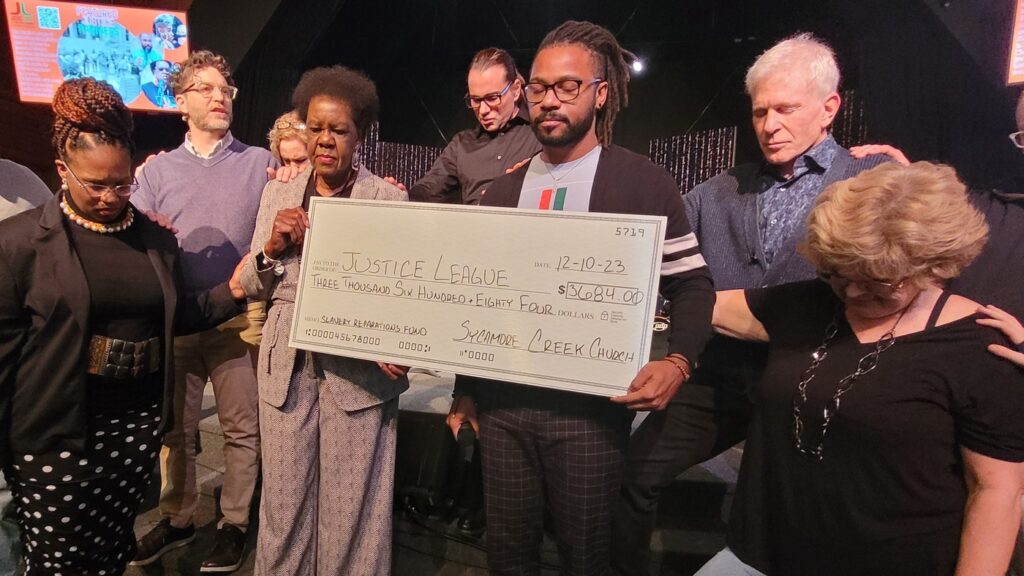
Congregants at Sycamore Creek Church bow to Justice League of Greater Lansing leader Willie Bryan and Prince Sorace in prayer as they receive a large check.
Sophia Salibi/WKAR
hide caption
toggle caption
Sophia Salibi/WKAR

Congregants at Sycamore Creek Church bow to Justice League of Greater Lansing leader Willie Bryan and Prince Sorace in prayer as they receive a large check.
Sophia Salibi/WKAR
2020 was a turning point for Willie Bryan of Lansing, Michigan. Between the racial injustice that followed the killing of George Floyd and the health disparities that hit the African American community during the pandemic, she knew now was the time to take her action.
“Slavery is the original sin, and its process leaves a trail of destruction,” Bryan said.
For Brian, the answer was reparations for what she called a debt to African Americans.
She became active at her church, First Presbyterian Church of Lansing, a predominantly white congregation. Pastor Stanley Jenkins remembers when Brian first brought up the topic.
“My first reaction was, 'Well, that's not going to work.' And right away, I said, 'Let's do it.'”
Most of the church supported them and pledged $100,000 over 10 years. Individual believers donated $80,000.
“There was a sense that people were waiting for someone to take the first step, even if they didn't realize it,” Jenkins said.
This effort became known as the Justice League of Greater Lansing. They visited many chapels in the area and explained their mission.
One church donated half of the funds it received from the sale of its parsonage. The Rev. Kit Carlson is the pastor of All Saints Episcopal Church.
“We compared the today's value of homes of a similar age and size in East Lansing to homes of a similar age and size in formerly redlined areas of Lansing. I did,” she said. “The difference is that our parsonage sold for $250,000, and a comparable home in a previously redlined area sold for $80,000. So the long-term effects of redlining. appeared in a very dramatic way, and you can see that it's having an impact to this day.” ”
People also wrote the Justice League in their wills. Last December, the federation received a three-year commitment from another Lansing congregation to donate money from donations.

In June 2023, the Justice League of Greater Lansing organized a Juneteenth event in front of the Michigan State Capitol, where white members of the faith community and other allies protested the enslavement of the Presbyterian Church in the United States. He read aloud a public apology he issued to the descendants of African-Americans who were killed.
Courtesy of Justice League of Greater Lansing
hide caption
toggle caption
Courtesy of Justice League of Greater Lansing

In June 2023, the Justice League of Greater Lansing organized a Juneteenth event in front of the Michigan State Capitol, where white members of the faith community and other allies protested the enslavement of the Presbyterian Church in the United States. He read aloud a public apology he issued to the descendants of African-Americans who were killed.
Courtesy of Justice League of Greater Lansing
In less than three years, the organization has raised about $400,000.
For Brian, the Michigan job is just the beginning.
“Ideally, the national government would heal those wounds, but that is not happening,” she said. “We want to influence state government, but that’s not happening.”
She points to a bill first introduced 30 years ago by the late Michigan Rep. John Conyers that simply studies federal reparations. In 2021, the House Judiciary Committee took up a bill currently sponsored by Democratic Texas Representative Sheila Jackson Lee. It was the first time the committee acted on this issue, but nothing happened after that. The bill has not yet received a vote in the House of Representatives.
In California, lawmakers have proposed reparations bills that focus on racial disparities, the wealth gap, and the return of land once owned by African Americans, but have stopped short of proposing cash reparations. There wasn't.
Additionally, the city of Detroit's reparations task force is experiencing vacancies and backlogs, and there is a possibility that the report that was scheduled to be released this year may be delayed.
“As a grassroots organization, we want to make an impact at the top level,” Brian said. “We want to appeal to the core and say, 'Hey, the people want people to be whole.'”
Now, the Justice League is at a turning point of its own. For the first time, funds from that endowment will soon be redistributed as academic scholarships. Ten students in the area will each receive $5,000.
The federation's president, Prince Solas, says he wants to enable people of his generation to stay in the area with the help of money from the Home Ownership and Business Support Fund.
“If that ambition, drive and creativity aren’t coupled with financial stability and foundations, we can’t grow.”
For Solace and Bryan, the heart of reparations is repair, and they see their work as a step in the right direction to normalize what is supposed to be repairing the country.


